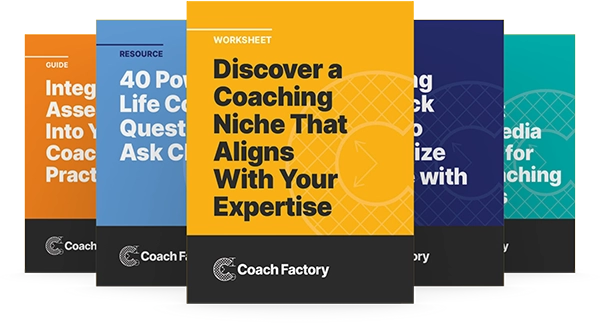As a coach, you’re no stranger to the value that assessments can bring to your practice. They’re trusty navigation tools that help us understand where we are, chart the course for where we want to go, and keep us on track along the journey. Whether you’re a life coach, health coach, business coach, or you specialize in another area, these tools are instrumental in bringing clarity, measuring progress, and creating personalized strategies for your clients.
Why Use Assessment Tools in Coaching?
Assessments boost client self-awareness and enable coaches to identify strengths and areas for growth. Over time, this leads to higher client engagement, as they are more likely to commit to their goals when they understand their strengths and personal attributes. Lastly, assessments are benchmarks for measuring clients’ growth throughout the coaching process by tracking progress and demonstrating tangible results.
What Assessments Are Used in Coaching?
In school, a teacher uses an assessment to measure learning or comprehension. But coaches use assessments to measure components of personal and professional development — things like empathy, resilience, inner drives and motivations, strengths, personality tendencies, interests, styles of interaction, and more. Generally these assessments are self-reported. But a skilled coach will combine their own observations with assessment results to bring the client a well-rounded picture.
In the vast ocean of coaching tools, it’s not always easy to know which ones will best serve your unique practice and your clients’ specific needs. You want to provide the best possible guidance, but with so many choices, where do you start? Below are the most commonly-used coaching assessments, sorted by five broad niches, and the specific goals each instrument accomplishes.
Career Coaching Assessments
Career coaching assessments facilitate self-awareness and informed career decisions. They help clients understand their strengths, interests, values, and competencies, which are vital for job satisfaction and success. They are especially beneficial in career transitions, offering insights into transferrable skills and new paths.
Strong Interest Inventory
The Strong Interest Inventory is a valuable resource for understanding personal career interests. Assessing client likes and dislikes in various activities, work-related tasks, and subjects generates an overview of potential careers that align with those interests. It doesn’t only focus on what you are good at but also what you enjoy doing, ensuring a satisfactory and fulfilling career.
Myers-Briggs Type Indicator (MBTI)
The Myers-Briggs Type Indicator explores personality types. Derived from Carl Jung’s psychological type theory, the MBTI assessment pinpoints client preferences in how they interact with the world, process information, make decisions, and structure their lives. Understanding these elements can help clients determine which career paths may be most harmonious with their personal style and preference.
Skills Profiler
The Skills Profiler bridges the gap between interests and personality with tangible competencies. This self-assessment tool allows clients to identify skills they’ve developed throughout their work history. It highlights transferrable skills and areas of expertise applicable in various professional contexts. It helps clients discover potential skill gaps that inform the direction of further professional development.
Each assessment provides a unique perspective, but when used collectively, they offer a comprehensive understanding of an individual’s career potential.

Health Coaching Assessments
Health coaches use health coaching assessments to identify a client’s physical condition, dietary habits, and potential health risks. These assessments guide the formulation of customized coaching plans to achieve optimal health and well-being.
Physical Activity Readiness Questionnaire (PAR-Q)
The Physical Activity Readiness Questionnaire is a valuable tool in determining a person’s readiness for physical exercise. Assessing factors such as pre-existing medical conditions and physical activity levels identifies any potential risks or limitations associated with exercise. Its importance lies in ensuring that physical activity is safe and effective for each client by considering an individual’s unique health profile. It provides a baseline for designing suitable workout routines and monitoring progress over time.
Nutrition and Dietary Assessment
Nutrition and Dietary Assessment tools evaluate clients’ dietary habits and nutritional status, providing insight into their overall nutrition health. These tools assess various aspects such as 24-hour food intake, nutrient adequacy, eating patterns, and lifestyle factors that affect nutrition. These assessments provide a basic understanding of the link between dietary habits and health status. They also identify potential nutritional deficiencies or excesses that aid in creating tailored dietary plans that contribute to optimal health.
Health Risk Assessment
Health Risk Assessments draw data from various sources to identify potential health risks. It provides a holistic view of an individual’s health by identifying risk factors like lifestyle choices, family history, and current health status. These assessments allow for personalized feedback and the development of interventions to promote health, prevent disease, and sustain functionality. Health Risk Assessments are the foundation of a preventative approach, focusing on maintaining and enhancing health rather than merely reacting to health issues as they arise.
Business and Executive Coaching Assessments
Business and executive coaching assessments provide important insights into an executive’s leadership style, interpersonal dynamics, and emotional intelligence. They serve as a catalyst for personal growth by enhancing an executive’s effectiveness and impact within their organization.
Impact 360 Feedback Assessment
Impact 360 assessments gather feedback from all around a client. This instrument takes into account the perspectives of superiors, peers, and subordinates. This multi-source feedback offers a detailed view of an executive’s performance, leadership abilities, and areas of improvement, eliminating the potential bias that may come from a single source. It also creates a platform for open dialogue and continuous improvement.
Emotional Intelligence (EQ) Assessments
Emotional Intelligence (EQ) Assessments refer to a client’s ability to perceive, understand, and manage their own emotions and those of others. It’s a crucial skill set for executives that impacts decision-making, stress management, communication, and team performance.
The EQ Assessment measures core components of emotional intelligence, such as self-awareness, self-regulation, motivation, empathy, and social skills, providing insights into an executive’s emotional functioning and interpersonal effectiveness.
The 5 Voices
The 5 Voices assessment tool helps executives understand their unique communication style and how others perceive it. Based on the five voices — Pioneer, Connector, Creative, Guardian, and Nurturer — it identifies an executive’s dominant voice and helps them recognize and value the other voices within their team.
By understanding these distinct communication styles, executives can enhance their influence, build diverse and complementary teams, and foster effective communication.

Life Coaching Assessments
Life coaching assessments facilitate personal growth and self-understanding and promote a balanced, fulfilling life. They help clients gain clarity on their current selves and define their desired future selves.
The Wheel of Life
The Wheel of Life is a tool that encourages clients to reflect on various aspects of life, such as career, health, relationships, personal growth, recreation, and financial stability. Rating satisfaction in each area provides a visual representation of one’s life balance or imbalance. This overview helps clients identify areas requiring more attention and guides them in setting meaningful, well-rounded life goals.
MCode
The Motivation Code, or MCode, is a motivational assessment that helps clients discover their core motivators, interests, and natural work styles. Understanding these key drivers can aid clients in making satisfying life and career choices that align with their true selves. MCode encourages individuals to seek fulfillment in their careers and all aspects of life, contributing to a holistic sense of well-being.
Disclosure: Coach Factory is proud to be a part of Motivations AI, which also owns MCode.
VIA Character Strengths
The VIA Character Strengths is a strengths assessment that highlights a client’s innate positive qualities. It identifies a person’s unique character strengths from a list of 24, such as creativity, bravery, love, kindness, and perseverance. Recognizing and leveraging these inherent strengths can boost self-esteem, enhance personal effectiveness, and foster authentic living.
Leadership Coaching Assessments
Leadership coaching assessments are valuable tools that enable leaders to understand and enhance their leadership capabilities. They provide insights into leadership behaviors, interpersonal dynamics, and conflict resolution styles.
Leadership Practices Inventory (LPI)
The Leadership Practices Inventory is a reputable instrument that measures the five practices of exemplary leadership: Model the Way, Inspire a Shared Vision, Challenge the Process, Enable Others to Act, and Encourage the Heart. Based on Kouzes and Posner’s extensive research on leadership, the LPI helps leaders assess the frequency of these behaviors in their leadership practice, providing a clear path for improvement and development.
DiSC Assessment
DiSC Assessment is a behavioral tool based on William Moulton Marston’s theory. The DISC model explores four primary behavioral styles: Dominance, Influence, Steadiness, and Conscientiousness. By understanding their own and others’ behavioral preferences, leaders can improve communication, build effective teams, and adapt their leadership style to meet the needs of their team members.
Thomas-Kilmann Conflict Mode Instrument (TKI)
The Thomas-Kilmann Conflict Mode Instrument (TKI) provides a perspective on conflict management, an important aspect of leadership. It identifies five conflict styles — competing, collaborating, compromising, avoiding, and accommodating — and helps leaders understand their preferred style in conflict situations. The TKI encourages leaders to consider the appropriateness of their conflict style to individual situations for more effective conflict resolution and improved team dynamics.
Coaching Assessments Tools Benefit Coaches and Clients
Coaching assessment tools are essential in all coaching niches. They help coaches propel personal and professional growth in their clients’ lives by facilitating self-understanding and guiding them in setting and achieving meaningful goals. They enable coaches to create customized client strategies, boost engagement, and measure progress effectively.
Remember, choosing the right assessment tools is just like selecting the right ingredients for a recipe — it’s all about what works best for your unique clients and their goals. Don’t be afraid to mix and match, to try new things, and most importantly, to listen to your clients’ feedback.
Your passion for coaching coupled with these powerful tools will undoubtedly create transformative experiences for your clients. So go ahead, explore these tools, embrace the ones that resonate with you and your coaching style, and watch as they bring a new depth to your practice.
Stay curious, keep learning, and remember — we’re all on this coaching journey together. Until next time, happy coaching!


